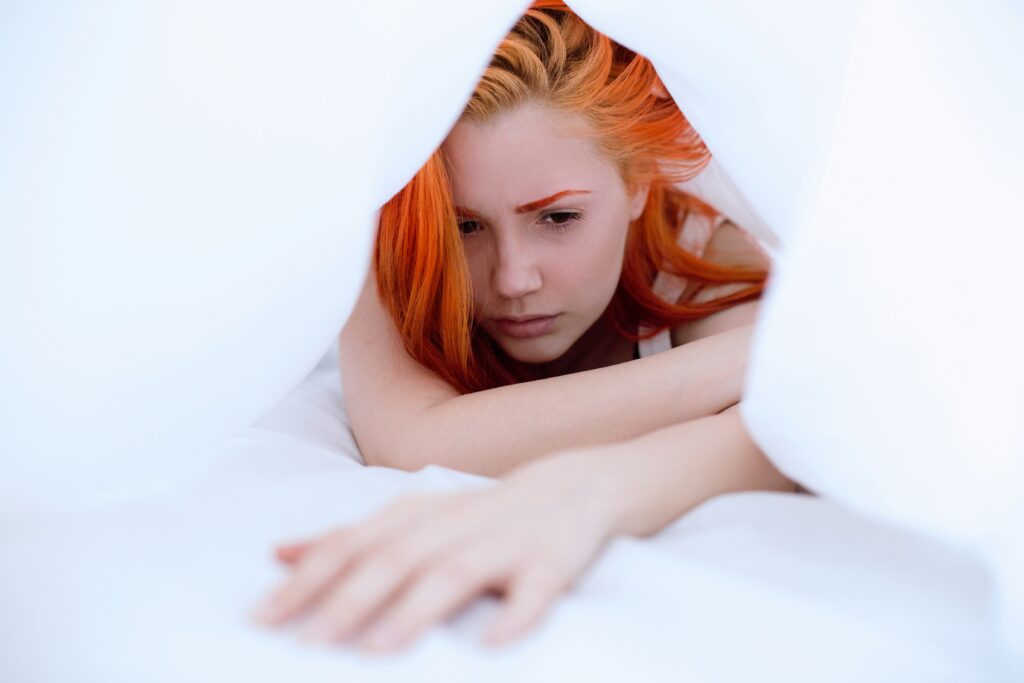Sleep and anxiety are deeply connected. Perhaps this isn’t news to you, but you may be curious about how significantly one affects the other. In this blog, we’ll explore the relationship between sleep and anxiety, how poor sleep can exacerbate anxiety, and how improving sleep hygiene can be a powerful tool in managing it. By understanding how sleep impacts anxiety, we hope to inspire you to take control of both your rest and your mental health.
The Link Between Sleep and Anxiety
Let’s be honest: anxiety can make it difficult to fall asleep. Many people with anxiety find themselves lying awake at night, their minds racing with worries, fears, or overwhelming thoughts. However, it’s important to understand that poor sleep can increase anxiety levels, just as anxiety can disrupt sleep. This vicious cycle can be highly detrimental to our overall health and quality of life.
Despite popular belief, the brain is incredibly active during sleep. It processes emotions, consolidates memories, and regulates mood. Sleep plays a crucial role in the body’s ability to recover from stress and anxiety. When sleep is disrupted or insufficient, the brain’s ability to manage stress is compromised. This can lead to increased anxious feelings the following day.
If this resonates with you, know that you’re not alone, and there is hope for breaking this cycle. The first step is awareness and a deeper understanding of what’s happening. Read on as we dive into the effects of poor sleep on anxiety.
How Poor Sleep Contributes to Anxiety
Impaired Emotional Regulation
Sleep deprivation affects the brain regions responsible for emotional regulation, such as the prefrontal cortex and the amygdala. The amygdala, which processes emotions like fear and anxiety, becomes more reactive when we’re sleep-deprived. This heightened sensitivity can lead to exaggerated emotional responses to stressors, making situations seem more threatening than they are.
The prefrontal cortex, which helps regulate emotional responses, becomes less efficient without proper rest. This makes it harder to calm yourself or think logically when faced with anxiety-provoking situations, intensifying your anxious feelings.
Increased Stress Hormones
When we don’t get enough sleep, the body produces higher levels of stress hormones, particularly cortisol. Elevated cortisol levels can increase feelings of anxiety, making it harder to relax or stay calm. High cortisol can also interfere with bodily functions like digestion, immune response, and blood sugar regulation—all of which contribute to heightened anxiety.
Heightened Physical Symptoms of Anxiety
Anxiety often comes with physical symptoms such as a racing heart, shallow breathing, muscle tension, and dizziness. Sleep deprivation can amplify these symptoms, making you feel physically overwhelmed and on edge. Additionally, lack of sleep reduces your ability to cope with these sensations, intensifying the experience of anxiety.
Now that we understand how sleep deprivation impacts anxiety, let’s explore the benefits of quality sleep and actionable tips for improving both sleep and anxiety.
The Benefits of Quality Sleep for Anxiety
Restoration of Emotional Balance
Deep, restorative sleep allows the brain to process emotions more effectively. During rapid eye movement (REM) sleep, the brain consolidates memories and processes emotions, reducing emotional reactivity. This enables you to respond thoughtfully to stressors rather than reacting anxiously.
Regulation of Stress Hormones
Sufficient sleep helps keep cortisol levels in check. When the body gets enough rest, it is better equipped to manage stress and recover from daily pressures. Balanced cortisol levels help stabilize your mood and reduce feelings of being overwhelmed.
Improved Cognitive Function and Decision-Making
Sleep is essential for cognitive function, including memory, attention, and decision-making. When well-rested, your brain can focus more effectively, make clear decisions, and prioritize tasks without becoming overly stressed—a key factor in managing anxiety related to work or personal responsibilities.
Physical Relaxation
Sleep provides the body with time to rest and recover physically. Muscle tension decreases, heart rate stabilizes, and the body resets itself for the next day. This physical relaxation can alleviate the sensations associated with anxiety, such as tight muscles, heart palpitations, or shallow breathing.
Tips for Improving Sleep and Managing Anxiety
Poor sleep and crippling anxiety are messages from your body—signals to make a change. At Awakened Path, we believe in the transformative power of self-awareness and understanding the wisdom of our bodies. Here are some holistic techniques to strengthen the mind-body connection and improve your sleep while reducing anxiety symptoms:
Establish a Consistent Sleep Schedule
Going to bed and waking up at the same time every day helps regulate your body’s internal clock. Try to maintain this schedule, even on weekends, to keep your sleep pattern consistent.
Create a Relaxing Bedtime Routine
Engage in calming activities before bed to signal your body that it’s time to wind down. This might include reading, practicing deep breathing, taking a warm bath, or doing gentle yoga stretches.
Limit Electronics Before Bed
Avoid screen time from phones, tablets, or laptops, as blue light disrupts your sleep-wake cycle. Consider using dim lighting and engaging in non-screen activities in the hour before bed.
Practice Mindfulness and Relaxation Techniques
If anxiety keeps you awake, try relaxation strategies such as deep breathing or progressive muscle relaxation. If calming your mind feels challenging, try counting backward from 100 to disrupt racing thoughts. Mindfulness practices can help you focus on the present moment, reducing the rumination that fuels anxiety.

Move Your Body
Regular physical activity promotes better sleep by reducing stress and tension. If your job is sedentary, find ways to incorporate movement throughout your day—take the stairs, stretch periodically, or go for walks. Consistent activity helps prepare your body for restful sleep.
Reclaim Your Sleep
The relationship between sleep and anxiety is clear: good sleep is essential for managing anxiety, while poor sleep can worsen it. Prioritizing sleep hygiene and making conscious efforts to improve your rest can significantly reduce anxiety and enhance your overall well-being. Rest isn’t a luxury; it’s a vital part of taking care of your mind and body.
At Awakened Path, we’re here to support you on your journey toward less anxiety and more restorative sleep. By breaking the cycle of sleep deprivation and anxiety, you can begin living a healthier, more balanced life. Let’s work together to reclaim your sleep and achieve holistic well-being.


